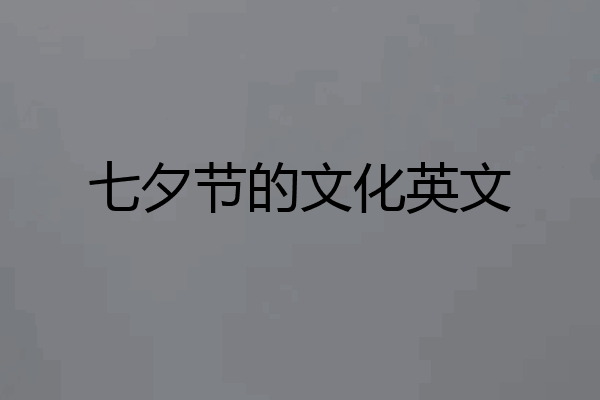
wuli小拧
Long, long ago, there was an honest and kind-hearted fellow named Niu Lang (Cowhand). His parents died when he was a child. Later he was driven out of his home by his sister-in-law. So he lived by himself herding cattle and farming. One day, a fairy from heaven Zhi Nu (Weaver Maid) fell in love with him and came down secretly to earth and married him. The cowhand farmed in the field and the Weaver Maid wove at home. They lived a happy life and gave birth to a boy and a girl. Unfortunately, the God of Heaven soon found out the fact and ordered the Queen Mother of the Western Heavens to bring the Weaver Maid back.


定州人民
七夕节:Double Seventh Festival。
1、读音:[ˈdʌbl] [ˈsevnθ][ˈfestɪvl]
2、七夕节:
七夕始于汉朝,是流行于中国及汉字文化圈诸国的传统文化节日。
相传农历七月七日夜或七月六日夜妇女在庭院向织女星乞求智巧,故称为“乞巧”。其起源于对自然的崇拜及妇女穿针乞巧,后被赋予了牛郎织女的传说使其成为象征爱情的节日。
3、七夕果品:
七夕乞巧的应节食品,以巧果最为出名。
巧果又名“乞巧果子”,款式极多。主要的材料是油、面、糖、蜜。《东京梦华录》中称之为“笑厌儿”、“果食花样”,图样则有捺香、方胜等。宋朝时,街市上已有七夕巧果出售,巧果的做法是:先将白糖放在锅中熔为糖浆,然后和入面粉、芝麻,拌匀后摊在案上捍薄,晾凉后用刀切为长方块,最后折为梭形巧果胚,入油炸至金黄即成。手巧的女子,还会捏塑出各种与七夕传说有关的花样。
3、国外的情人节:
情人节又叫圣瓦伦丁节,即每年的2月14日,是西方国家的传统节日之一。这是一个关于爱、浪漫以及花、巧克力、贺卡的节日 男女在这一天互送礼物用以表达爱意或友好。
公元270年——罗马圣教徒瓦伦丁被处死,此日被后人定为“情人节”。瓦伦丁节,又称情人节,是欧美和大洋洲的一些国家的民族节日。

豌豆大晟
1、香桥会
In yixing, jiangsu province, there are qixi xiangqiao customs.
(在江苏宜兴,有七夕香桥会习俗。)
Every year on the Chinese valentine's day, people come to take part in the festival.
(每年七夕,人们都赶来参与,搭制香桥。)
2、接露水
In the countryside of zhejiang province, the custom of catching dew with washbasin is popular.
(浙江农村,流行用脸盆接露水的习俗。)
It is said that the dew on the Chinese valentine's day is the tears when the cowherd and weaver girl meet.
(传说七夕节时的露水是牛郎织女相会时的眼泪,如抹在眼上和手上,可使人眼明手快。)
3、拜七姐
July 7's seven nianghui, guangdong called "worship seven sister", fujian Taiwan is called "worship seven niangma".
(七月七的七娘会,广东多称“拜七姐”,闽台即称为“拜七娘妈”。)
4、穿针乞巧
Threading, also known as "sai qiao", that is, women's competition threading.
(穿针乞巧,也叫“赛巧”,即女子比赛穿针。)
They were decorated with colored thread and wore seven-hole needles. The faster they wore, the more they begged.
(她们结彩线,穿七孔针,谁穿得越快,就意味着谁乞到的巧越多。)
5、喜蛛应巧
The tarantula should also be an earlier way of begging.
(喜蛛应巧也是较早的一种乞巧方式。)
The custom is a little later than threading needle begging, roughly from the northern and southern dynasties.
(其俗稍晚于穿针乞巧,大致起于南北朝之时。)

apple13810
Double-Seventh DayThe Double-Seventh Day refers to the seventh day of the seventh month on the Chinese lunar calendar. The day is not as well known as many other Chinese festivals. But almost everyone in China, young and old, is very familiar with the story behind this festival.A long long time ago, there was a poor cowherd, Niulang. He fell in love with Zhinu, “the Girl Weaver". Virtuous and kind, she was the most beautiful being in the whole universe. Unfortunately, the King and Queen of Heaven were furious finding out that their granddaughter had gone to the world of Man and taken a husband. Thus, the couple was separated by a wide swollen river in the sky and can only meet once a year on the seventh day of the seventh lunar month.The poor couple of Niulang and Zhinu each became a star. Niulang is Altair and Zhinu is Vega. The wide river that keeps them apart is known as the Milky Way. On the east side of the Milky Way, Altair is the middle one of a line of three. The end ones are the twins. To the southeast are six stars in the shape of an ox. Vega is to the west of the Milky Way; the star around her form in the shape of a loom. Every year, the two stars of Altair and Vega are closest together on the seventh day of the seventh lunar month.This sad love story has passed down from generation to generation. It is well known that very few magpies are seen on the Double-Seventh Day. This is because most of them fly to the Milky Way, where they form a bridge so that the two lovers might come together. The next day, it is seen that many magpies are bald; this is because Niulang and Zhinu walked and stood too long on the heads of their loyal feathered friends.In ancient times, the Double-Seventh Day was a festival especially for young women. Girls, no matter from rich or poor families, would put on their holiday best to celebrate the annual meeting of the cowherd and the Girl Weaver. Parents would place an incense burner in the courtyard and lay out some fruit as offerings. Then all the girls in the family would kowtow to Niulang and Zhinu and pray for ingenuity.In the Tang Dynasty about 1,000 years ago, rich families in the capital city of Chang'an would set up a decorated tower in the courtyard and name it Tower of Praying for Ingenuity. They prayed for various types of ingenuity. Most girls would pray for outstanding sewing or cooking skills. In the past these were important virtues for a woman.Girls and women would gather together in a square and look into the star-filled night sky. They would put their hands behind their backs, holding needle and thread. At the word “Start”, they would try to thread the needle. Zhinu, the Girl Weaver, would bless the one who succeeded first.The same night, the girls and women would also display carved melons and samples of their cookies and other delicacies. During the daytime, they would skillfully carve melons into all sorts of things. Some would make a gold fish. Others preferred flowers, still others would use several melons and carve them into an exquisite building. These melons were called Hua Gua or Carved Melons.The ladies would also show off their fried cookies made in many different shapes. They would invite the Girl Weaver to judge who was the best. Of course, Zhinu would not come down to the world because she was busy talking to Niulang after a long year of separation. These activities gave the girls and women a good opportunity to show their skills and added fun to the fesstival.Chinese people nowadays, especially city residents, no longer hold such activities. Most young women buy their clothes from shops and most young couples share the housework.The Double-Seventh Day is not a public holiday in China. However, it is still a day to celebrate the annual meeting of the loving couple, the Cowherd and the Girl Weaver. Not surprisingly, many people consider the Double-seventh Day the Chinese Valentine's Day.